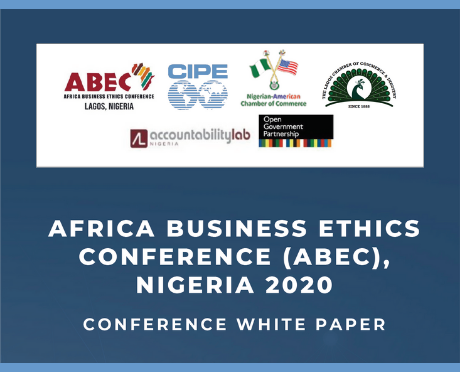- Africa Business Ethics Conference (ABEC), Nigeria 2020 — Conference White Paper
- Africa Business Ethics Conference (ABEC) 2020 — Key Themes and Speakers
 Introductory Note
Introductory Note
Looking ahead as CIPE publishes the Africa Business Ethics Conference (ABEC) 2020 White Paper summarizing the key takeaways from the conference, we are excited to announce that the place and date for ABEC 2021 has been fixed for Nairobi, Kenya around anticorruption week in December 2021. The focus ABEC 2021 dialogue will include issues highlighted in previous ABEC conferences documented in the ABEC 2019 and 2020 White Papers, lessons from the pandemic, and will explore new solutions and frontiers for ensuring public and private sector integrity, particularly within the context of the unprecedented times of the COVID-19 pandemic.
The conference will be a hybrid event that will host only the permitted number of in-person participants per day and an unlimited number virtually. It will provide opportunities to showcase innovation in addressing corruption and for collaboration amongst experts and stakeholders.
Executive Summary
The Africa Business Ethics Conference offered an avenue for a broad base of enterprises and stakeholders to appreciate the corrosive effects of corruption on the long-term sustainability of business, industries, and the economy in Nigeria and in Africa. Compelling speakers identified the obvious and forgotten consequences of corruption on business operations and the daily lives of citizens. The speakers came together to proffer solutions to address these consequences, summarized in the overarching themes presented in this White paper.
Through the conference deliberations, there was a convergence on 7 overarching themes that provide every reader information and direction about what the anti-corruption reform priorities are in Nigeria. An overall convergence of the deliberation developed around the need for broad, collective commitment to ethics and integrity as the new frontier for growth and sustainable development in African economies, with particular focus on supporting the Micro-, Small- and Mid-sized enterprises (MSMEs).
Parallel to direct anticorruption efforts, the consensus at the conference was that all enterprises and economic stakeholders in Nigeria have a collective responsibility to initiate, commit to and support interventions under one or more of the thematic focus areas. These interventions will facilitate positive and equitable outcomes to advance effective efforts to tackle corruption in Nigeria and in Africa.
Conference members also called for a review of the existing legal and institutional framework in Nigeria. A thorough review must ensure that the framework aligns with the ideals of a competitive market and democratic nation that deters and prevents corrupt activity through its social structures. This review would also ensure that any sanctions imposed are commensurate with the nature of corrupt activity and are fairly and justly determined.
The conference emphasized the need for proactive leadership from the business community in Africa and highlighted the current role of business leaders and captains of industry in efforts to embed ethical behavior in the Nigerian system. Research on ethics, shared values, behavior, and virtues is essential to enhance business decision-making at all levels, particularly at the leadership level. Proactive action of business membership organizations is necessary, including the development of mandatory codes of ethics for members as a way of entrenching self-regulation.
Published Date: August 27, 2021
